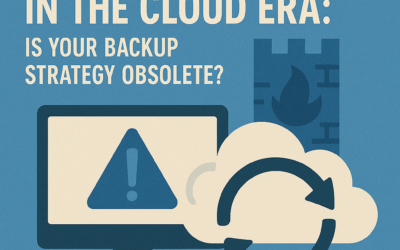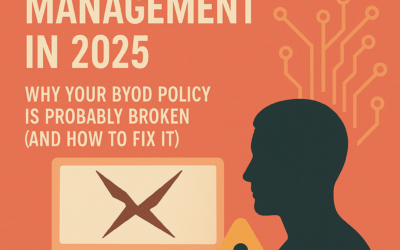Healthcare is one of the most important industries in the world. It keeps us alive and well, and always evolving to meet our needs.
We’ve discussed the importance of cybersecurity before. But, as the healthcare industry continues to grow, so do the cybersecurity threats.
Unfortunately, it’s also one of the most vulnerable industries regarding cybersecurity. Healthcare organizations are constantly under attack from cybercriminals looking to exploit vulnerabilities and steal sensitive data.
Healthcare organizations are already under immense pressure to protect patient data. But you’re mistaken if you think that’s the only cybersecurity threat they face. Not only is this sector subject to the same threats as any other business, but it also has a few unique challenges.
This post will discuss the top cybersecurity challenges in healthcare and how an MSP can help you overcome them.
Let’s dive in.
Lack of Security Awareness
One of the biggest challenges in healthcare cybersecurity is employees’ lack of security awareness. Many healthcare workers are not aware of the importance of cybersecurity or the dangers of cyberattacks. As a result, they may not take the necessary precautions to protect themselves or their patients.
Some of the common cybersecurity mistakes that healthcare employees make include:
- Using their personal devices for work tasks
- Failing to encrypt sensitive data
- Using weak passwords
- Opening suspicious emails and attachments
These are just a few things healthcare employees need to be aware of to protect their organizations. However, it’s not enough to just tell them what they need to do. They need to be trained on how to do it.
That’s where an MSP can help. A good MSP will have the resources and expertise to provide comprehensive security awareness training to your employees. They can also help you implement security policies and procedures that will make it easier for your employees to do their jobs securely.
Lack of Security Resources
Healthcare organizations often lack the resources they need to secure their systems properly. They may not have the budget to invest in strong security solutions or the personnel to monitor their networks. As a result, they may be more vulnerable to attacks.
An MSP can help by providing the resources you need to secure your network. An MSP can help by providing access to a team of security experts who can help identify vulnerabilities and implement solutions. MSPs can also help healthcare organizations manage security budgets and make the most of their resources.
Legacy Systems
Many healthcare organizations still rely on legacy systems, which can be difficult to secure.
One of healthcare’s most common cybersecurity challenges is that many organizations are still using legacy systems. This can make it difficult to keep up with the latest security threats and properly protect patient data. These systems may not have the same security features as newer systems, making them more vulnerable to attack.
An MSP can help by providing security solutions compatible with your legacy systems. They can also help you plan for a transition to newer, more secure systems.
Inadequate Security Controls
Another top challenge facing healthcare organizations is inadequate security controls. Many healthcare organizations have not implemented adequate security controls to protect their networks and data. As a result, they are vulnerable to attacks by cybercriminals.
A recent study by Ponemon Institute found nearly 60% of healthcare organizations were subject to cyberattacks, and half of them didn’t have adequate security controls in place. This lack of security controls leaves healthcare organizations vulnerable to cyber attacks.
An MSP can help healthcare organizations assess their security needs and implement appropriate security controls. MSPs can also help healthcare organizations develop and implement security policies and procedures that promote the use of effective security controls.
Compliance Issues
Healthcare organizations must comply with various regulations, such as HIPAA and HITECH. These regulations can be complex and difficult to understand. As a result, many organizations struggle to comply with them, which can put them at risk of fines and penalties.
An MSP can help healthcare organizations comply with regulations by providing data backup and recovery services, security monitoring, and user training. They can also help organizations implement security policies and procedures.
Data Breaches
Data breaches are another top cybersecurity challenge facing healthcare organizations. A data breach occurs when an unauthorized person gains access to sensitive data. Healthcare data is particularly sensitive because it can include personal information, medical records, and financial information.
A data breach can devastate a healthcare organization, causing financial losses, damage to reputation, and loss of customer trust. An MSP can help healthcare organizations prevent data breaches by providing security services such as data encryption and intrusion detection.
Insider Threats
With malicious intent, healthcare organizations are often targeted by insiders, such as employees or contractors. These insiders may have access to sensitive data or systems and may be able to exploit vulnerabilities. These individuals may unintentionally introduce malware or deliberately misuse their access to commit fraud or steal sensitive data.
An MSP can help healthcare organizations mitigate the risk of insider threats by providing comprehensive security solutions, including user activity monitoring and data loss prevention. MSPs can also help organizations educate employees on cybersecurity best practices and create policies and procedures to prevent and respond to insider threats.
To Wrap It Up
The healthcare industry faces a number of unique cybersecurity challenges. However, these challenges can be overcome with the help of a good MSP. A good MSP can help you assess your organization’s security needs and develop a comprehensive security solution that meets those needs. They can also provide the staff and resources you need to implement and maintain your security solution.
If you’re concerned about the cybersecurity challenges in healthcare, contact an MSP today. They can help you overcome these challenges and keep your organization safe.




